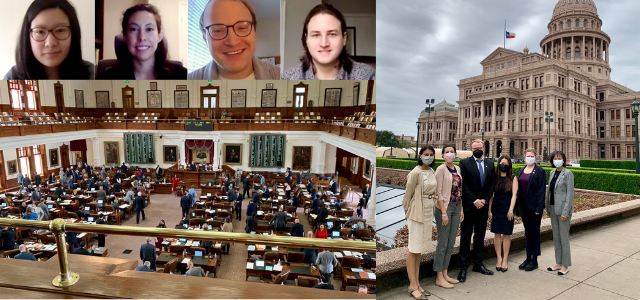TAMEST Helps Pilot Texas Science Policy Fellows Program with Rice University
TAMEST partnered with Rice University’s Baker Institute for Public Policy to test a pilot program of science policy fellows in 2021 for the 87th session of the Texas Legislature.
In May, fellows from the program joined the TAMEST Board of Directors virtually to share their experiences.
Melody Tan, who is completing her Ph.D. in Bioengineering at Rice, spearheaded the Texas Science Policy Fellowship pilot program. She was inspired by her participation in the Christine Mirzayan Science & Technology Policy Graduate Fellowship Program through the National Academies, which took her to Washington, D.C. in 2019, for three months to work in science policy.
“I stopped my research … and really got immersed in the science-policy ecosystem and really gained an understanding of how early-career scientists and engineers like myself could contribute to this space,” Tan said.
Upon her return to Houston to finish her Ph.D., Tan said she felt compelled to create more opportunities for other early-career scientists and engineers to gain exposure to the policy process, both locally at Rice and statewide in Texas. She quickly recruited Rice University’s Baker Institute for Public Policy and TAMEST for support.
In developing the pilot program, the vision was to provide early-career scientists and engineers experience engaging with policymakers and to also provide legislators with direct access to scientists and scientific information.
Though the fellows were unable to be paired with individual legislative offices due to the COVID-19 pandemic, they embedded with The Immunization Partnership, a Texas nonprofit organization that works to advance and advocate for immunizations in Texas.
“As we all know, during COVID-19, [immunizations have] been a really important topic,” Tan said. “So this has actually been a really unique opportunity for us to engage on this issue.”
Fourteen applications were received, and four pilot fellows were selected, all currently graduate students in science or engineering at Rice University.
“When I started graduate school, I didn’t realize that there was a whole other world beyond just being in the lab and doing research,” said Fellow Roxanna Llinas. “I jumped on this opportunity when I saw it because it seemed like there was a lot of anti-science [rhetoric] in government, and I realized that scientists need to get involved in order to enact change.”
Focusing on communicating science and getting a grasp of how policy is made was also paramount to the program.
“I didn’t know how bills were passed in Texas,” Llinas said. “Honestly, I thought it would be a lot shorter and simpler of a process, but learning that some of these bills come up year after year after year with a two-year legislative break in between, I just thought, ‘these people run marathons!’”
The fellows began their part-time, three-month fellowship work on March 1 and continued it through the end of May. Work included writing memos, researching one-pagers, listening to legislative hearings and testimony, identifying for and against “anti-vaccine” arguments and more.
“It’s almost like the year of science policy — all these scientific bills and vaccine policies were front and center in the Texas Legislature, and it was really exciting trying to navigate through … to alleviate a lot of the stresses and misinformation going around regarding the pandemic,” said Fellow Adam Navara. “[Also,] I was pleasantly surprised by the amount of bipartisan support these science-based bills found in the Texas Legislature. A lot of these legislators want to support science and write policies that are fact-based and help the most Texans.”
Despite most of the fellowship taking place virtually, some of the fellows did take a trip to Austin in April to attend hearings in person. Getting to see a bill they helped research get passed was a once-in-a-lifetime opportunity.
“Personally, being able to contribute materials and support for Texas Senate Bill 1353, which deals with equity of vaccine access, and getting to actually see it pass a vote in the senate, makes me feel like I’ve had a positive impact on the challenges to immunization in the state of Texas,” Pilot Fellow Robert Laroche said. “It has been an incredibly fulfilling experience … and has been a great opportunity for me to get more involved in science policy early in graduate school before I figure out what I want to do next.”
As the pilot comes to a close, Tan says they are already looking to what could be improved for future years.
“This [was] a pilot program in a very atypical year,” Tan said. “Hopefully in the future, during the legislative session, we won’t be in the middle of a pandemic and can aim to do things a little more in person.”
Tan hopes this small pilot can eventually transform into a statewide program for researchers across Texas looking to get more involved on a policy level.
“This pilot program was run with me at Rice, founding and directing it, and our pilot fellows were from Rice,” Tan said. “…But ultimately, I think this would be the most effective if it were a statewide program, open to graduate students in science and engineering across the state.”
Pictured above: Pilot Fellows Robert Laroche, Roxanna Llinas, Esther Lou, and Adam Navara with Pilot Director and Founder Melody Tan; photos courtesy of Melody Tan.


